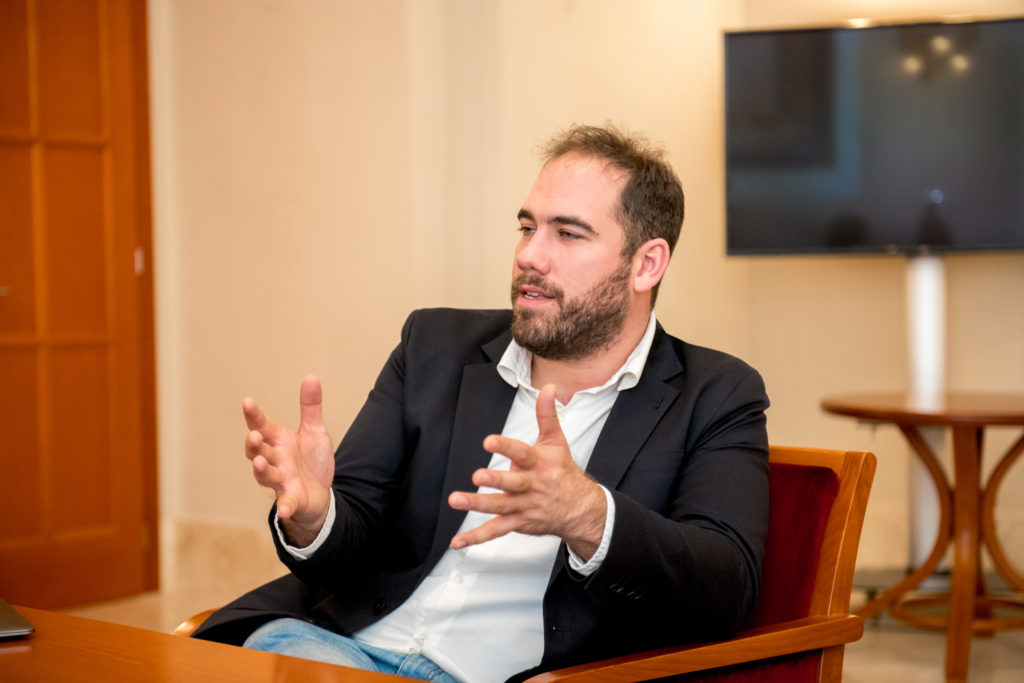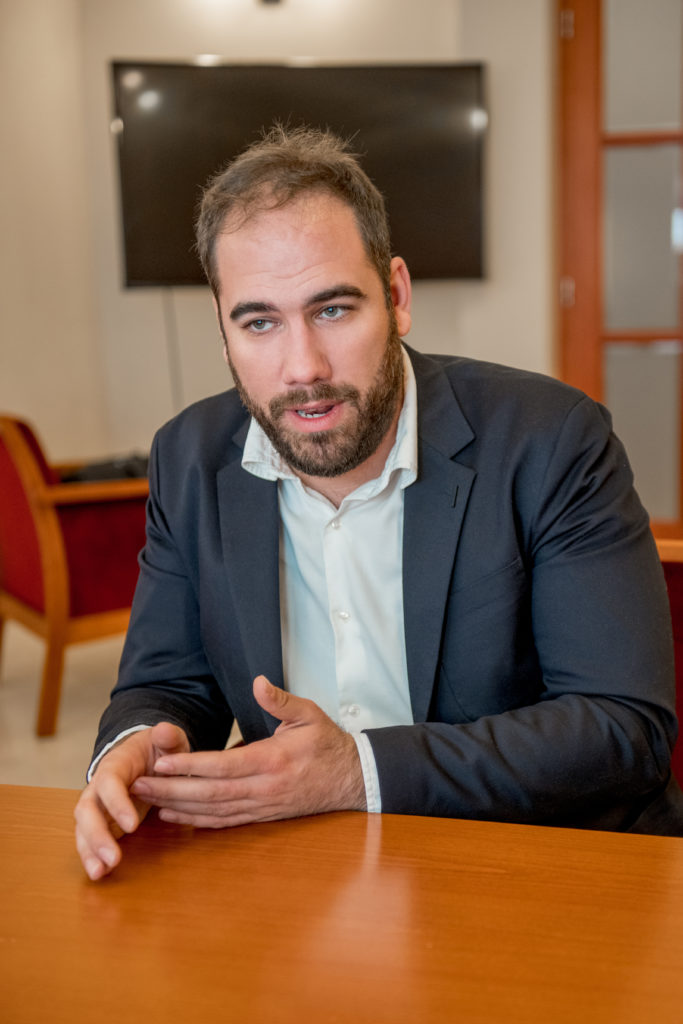“We need to focus on substantial issues”

“We wanted the strategy to be a living document, a blueprint for action. The Senate and the Board are presented a report every six months on the implementation of the institutional development plan. We discuss the lessons learned and make adjustments, when necessary, while keeping the overall strategic goal of achieving international excellence constant,” says Márton Barta, Head of Strategy at Corvinus University, right at the beginning of the interview.
The first few years were marked by major structural changes, including the abolition of faculties, the restructuring of the entire educational portfolio, and the creation of important and previously non-existent departments such as HR.
“With the restructuring of the Senate, we have closed a stage in the process of renewing the institution, as no further organisational restructuring of such a large scale is expected in the life of the University. We believe that the framework that defines our life is in completed, and from now on we can only focus on the substance,” said the Head of Strategy, referring to the University’s current stage in the renewal process.
Márton Barta stresses that the University is still at the beginning of its journey: “We cannot yet see the results of many of our decisions. We can only really evaluate a new degree when it has been completed by students who have found jobs in the labour market. We will keep monitoring the progress, as we have a lot of work to do to make Corvinus a truly outstanding university at the European level”.
Great interest in new courses
In the field of education, the revision of the portfolio is a major achievement of the first three years of renewal. The rationale behind the changes was to create generalist bachelor’s degrees and specialist master’s degrees, as well as completely new, future-oriented programmes.
From September 2023, students will be able to enrol on the Philosophy, Politics, Economics (PPE) bachelor’s degree, and, the first Data Science in Business bachelor’s degree and the first master’s degree in Political Economy will be launched. “The Open Day was a sell-out for the information sessions on the new programmes, and when we go to secondary schools to present, we also see a significant interest. We will get a clear picture once we have the enrolment figures, but the feedback so far is encouraging,” says Márton Barta about the new programmes.
The launch of one-year master’s programmes is also underway, with four programmes (Supply Chain Management, Public Policy and Management, Marketing, International Economy and Business) starting in autumn 2023, where students can complete their studies in one year through a special validation procedure. “From 2024, we expect to launch one-year master’s programmes in even more areas, where it will no longer be necessary to count credits acquired previously – however, this depends on certain legal reforms.”
The development of Corvinus Teaching Excellence (CTE) is also linked to the renewal of education. The programme is in its second phase of piloting and will eventually be used by the University to recognise excellence in teaching. According to the Head of Strategy, CTE is an excellent example of how a development project can only be successful if there is time and energy to engage people and integrate their feedback.
Research output, new international colleagues, AACSB accreditation

The University’s publication output is constantly improving, and according to the Head of Strategy, the institution can be immensely proud of this: “I think it shows the potential of Corvinus researchers that the University has been able to achieve significant results in a short time by setting clear expectations and creating an incentive and support system.”
According to Márton Barta, the next goal will be to increase the number of publications with international co-authors and to win more international research grants.
“This year, we have recruited nine foreign lecturers and several Hungarian colleagues who came from abroad to work at Corvinus have started working for us,” says Márton Barta, adding that recruitment has proved to be a much more complicated process than expected at the beginning.
He says the institution is slowly learning how to attract good colleagues to Hungary and singled out the Institute of Economics in particular for being at the forefront of this process. What is their secret? “They were persistent and determined. It is a long process, but slowly international academic recruitment becomes a mainstream procedure”.
Another element of internationalisation would be to attract more foreign students outside the Stipendium Hungaricum programme, but in this respect, according to the Head of Strategy, the University has not yet achieved a breakthrough: “The focus of the development of international student recruitment is on building up the regional network of secondary schools and expanding the double degree programmes, as well as on better reflecting the needs of international partner institutions in the renewal of courses, so that more exchange students can come to Corvinus”.
Márton Barta also highlighted the University’s AACSB accreditation as a major achievement for 2022.
Launch of the renewed student review
In terms of student services, the University has made progress in a number of areas, with Márton Barta highlighting the digitisation of processes. The award-winning MyCorvinus mobile application has been available for two years, and this year it has been extended with the Intézd Online (‘Manage Online’) functions, which are extremely popular among students. The student review system will be completely overhauled, and next year will see major improvements to Neptun. “We want Neptun to improve the student experience of administration, particularly when it comes to scholarships and international mobility”.
Also under development is the Corvinus Navigator app, which will help students plan their student career. The project is currently in its second pilot phase, focusing on mentoring, and more than 1000 students are already benefiting from this service.
Launch of Ménesi Campus, renewed community spaces in the Main Building
A big change in the life of the University for the next academic year will be the launch of the Ménesi Campus. The new complex on the side of Gellért Hill will not be a rival to the Main Building, but rather a complement to it. “The University will have a future-oriented campus, where all spaces support creative cooperation. The University’s business incubation programme will be based here, and students will also be able to attend the newly launched Data Science programme.
The Head of Strategy also highlighted that the University will finally have a campus with a garden, a sports complex and a four-storey dormitory with a capacity of 180 people. Competition for places here will be fierce, as it will be the only Corvinus dormitory with a panoramic view of the Danube.
The biggest infrastructure development in the coming period will be the renovation of the shared areas of the Main Building. The aim is to create homelike community spaces at the University, suitable for both work and leisure, as a 2020 survey clearly showed that this is what most students miss in the institution’s infrastructure.
In 2021, a community design concept was developed, integrating the ideas and visions of students and colleagues, to rethink the community functions of the whole building. A design competition was then held to select the architectural firm that will produce the final designs in two phases, by the end of 2022 and spring 2023.
“I think it’s one of the most beautiful buildings in Budapest, so we have a responsibility in how we renovate it,” says Márton Barta. They want to use contemporary solutions with the right sensibility and good taste. “We want the new additions to complement rather than obscure the wonderful qualities of this building.”
In particular, he pointed out that there is currently no symbolic meeting point and post-graduation photo spot in the University, and that the renovation will create an exciting and memorable architectural solution that aesthetically respects the building.
“Provided the funding is granted by the Board, we can renovate the north and south entrances in the summer, as well as the University’s ‘main street’, the ground floor Zsibongó (Recreation Corridor),” says the Head of Strategy, setting a target for 2023.